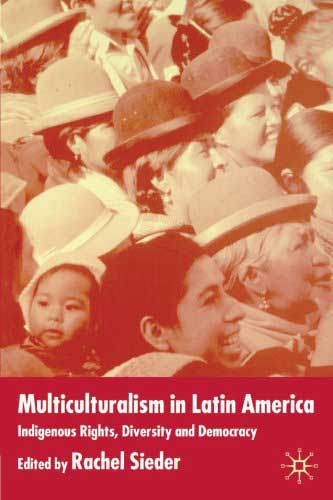 This publication in Spanish is the result of a collaborative research project with Nim Ajpu, the Association of Mayan Lawyers of Guatemala, that aims to offer analytical tools for ancestral authorities and state justice operators about how to approach cases of violations of indigenous women’s rights, adopting a perspective that takes into account intersecting forms of structural and interpersonal, public and private violence. Analyzing four paradigmatic cases, two heard in national courts and two processed by indigenous justice, I examine the extent to which the different strategies of accompaniment, framing, litigation or adjudication, and the legal reasoning expressed in the jurisprudence of both state and indigenous justice took the intersection of individual and collective rights of indigenous women into account.
This publication in Spanish is the result of a collaborative research project with Nim Ajpu, the Association of Mayan Lawyers of Guatemala, that aims to offer analytical tools for ancestral authorities and state justice operators about how to approach cases of violations of indigenous women’s rights, adopting a perspective that takes into account intersecting forms of structural and interpersonal, public and private violence. Analyzing four paradigmatic cases, two heard in national courts and two processed by indigenous justice, I examine the extent to which the different strategies of accompaniment, framing, litigation or adjudication, and the legal reasoning expressed in the jurisprudence of both state and indigenous justice took the intersection of individual and collective rights of indigenous women into account.
Libros
Routledge Handbook of Law and Society in Latin America
 An understanding of law and its efficacy in Latin America demands concepts distinct from the hegemonic notions of “rule of law” which have dominated debates on law, politics and society, and that recognize the diversity of situations and contexts characterizing the region. The Handbook presents cutting-edge analysis of the central theoretical and applied areas of enquiry in socio-legal studies in the region by leading figures in the study of law and society from Latin America, North America and Europe. Contributors argue that scholarship about Latin America has made vital contributions to longstanding and emerging theoretical and methodological debates on the relationship between law and society. Key topics examined include: the gap between law-on-the-books and law in action; the implications of legal pluralism and legal globalization; the legacies of experiences of transitional justice; emerging forms of socio-legal and political mobilization; debates concerning the relationship between the legal and the illegal. The Routledge Handbook of Law and Society in Latin America sets out new research agendas for cross-disciplinary socio-legal studies and will be of interest to those studying law, sociology of law, comparative Latin American politics, legal anthropology and development studies.
An understanding of law and its efficacy in Latin America demands concepts distinct from the hegemonic notions of “rule of law” which have dominated debates on law, politics and society, and that recognize the diversity of situations and contexts characterizing the region. The Handbook presents cutting-edge analysis of the central theoretical and applied areas of enquiry in socio-legal studies in the region by leading figures in the study of law and society from Latin America, North America and Europe. Contributors argue that scholarship about Latin America has made vital contributions to longstanding and emerging theoretical and methodological debates on the relationship between law and society. Key topics examined include: the gap between law-on-the-books and law in action; the implications of legal pluralism and legal globalization; the legacies of experiences of transitional justice; emerging forms of socio-legal and political mobilization; debates concerning the relationship between the legal and the illegal. The Routledge Handbook of Law and Society in Latin America sets out new research agendas for cross-disciplinary socio-legal studies and will be of interest to those studying law, sociology of law, comparative Latin American politics, legal anthropology and development studies.
Available on Amazon | Download Introduction PDF
(2019) ed. with Karina Ansolabehere and Tatiana Alfonso. Routledge Handbook of Law and Society in Latin America. Routledge. ISBN: 978-1138184459
Exigiendo justicia y seguridad: Mujeres indígenas y pluralidades legales en América Latina
 Across Latin America, indigenous women are organizing to challenge racial, gender, and class discrimination through the courts. Collectively, by engaging with various forms of law, they are forging new definitions of what justice and security mean within their own contexts and struggles. They have challenged racism and the exclusion of indigenous people in national reforms, but also have challenged ‘bad customs’ and gender ideologies that exclude women within their own communities. Featuring chapters on Bolivia, Colombia, Ecuador, Guatemala, and Mexico, the contributors to Demanding Justice and Securityinclude both leading researchers and community activists. From Kichwa women in Ecuador lobbying for the inclusion of specific clauses in the national constitution that guarantee their rights to equality and protection within indigenous community law, to Me’phaa women from Guerrero, Mexico, battling to secure justice within the Inter-American Court of Human Rights for violations committed in the context of militarizing their home state, this book is a must-have for anyone who wants to understand the struggle of indigenous women in Latin America.
Across Latin America, indigenous women are organizing to challenge racial, gender, and class discrimination through the courts. Collectively, by engaging with various forms of law, they are forging new definitions of what justice and security mean within their own contexts and struggles. They have challenged racism and the exclusion of indigenous people in national reforms, but also have challenged ‘bad customs’ and gender ideologies that exclude women within their own communities. Featuring chapters on Bolivia, Colombia, Ecuador, Guatemala, and Mexico, the contributors to Demanding Justice and Securityinclude both leading researchers and community activists. From Kichwa women in Ecuador lobbying for the inclusion of specific clauses in the national constitution that guarantee their rights to equality and protection within indigenous community law, to Me’phaa women from Guerrero, Mexico, battling to secure justice within the Inter-American Court of Human Rights for violations committed in the context of militarizing their home state, this book is a must-have for anyone who wants to understand the struggle of indigenous women in Latin America.
(2017) ed., Exigiendo justicia y seguridad: Mujeres indígenas y pluralidades legales en América Latina, CIESAS, México. ISBN: 978-607-486-445
Demanding Justice and Security: Indigenous Women and Legal Pluralities in Latin America
 Across Latin America, indigenous women are organizing to challenge racial, gender, and class discrimination through the courts. Collectively, by engaging with various forms of law, they are forging new definitions of what justice and security mean within their own contexts and struggles. They have challenged racism and the exclusion of indigenous people in national reforms, but also have challenged ‘bad customs’ and gender ideologies that exclude women within their own communities. Featuring chapters on Bolivia, Colombia, Ecuador, Guatemala, and Mexico, the contributors to Demanding Justice and Security include both leading researchers and community activists. From Kichwa women in Ecuador lobbying for the inclusion of specific clauses in the national constitution that guarantee their rights to equality and protection within indigenous community law, to Me’phaa women from Guerrero, Mexico, battling to secure justice within the Inter-American Court of Human Rights for violations committed in the context of militarizing their home state, this book is a must-have for anyone who wants to understand the struggle of indigenous women in Latin America. (Rutgers University Press, 2017)
Across Latin America, indigenous women are organizing to challenge racial, gender, and class discrimination through the courts. Collectively, by engaging with various forms of law, they are forging new definitions of what justice and security mean within their own contexts and struggles. They have challenged racism and the exclusion of indigenous people in national reforms, but also have challenged ‘bad customs’ and gender ideologies that exclude women within their own communities. Featuring chapters on Bolivia, Colombia, Ecuador, Guatemala, and Mexico, the contributors to Demanding Justice and Security include both leading researchers and community activists. From Kichwa women in Ecuador lobbying for the inclusion of specific clauses in the national constitution that guarantee their rights to equality and protection within indigenous community law, to Me’phaa women from Guerrero, Mexico, battling to secure justice within the Inter-American Court of Human Rights for violations committed in the context of militarizing their home state, this book is a must-have for anyone who wants to understand the struggle of indigenous women in Latin America. (Rutgers University Press, 2017)
(2017) ed. Demanding Justice and Security: Indigenous Women and Legal Pluralities in Latin America. Rutgers University Press: New Brunswick, N.J. ISBN: 978-0-8135-8792-9
Justicia de Género y Pluralidades Legales: Perspectivas Latinoamericanas y Africanas
This volume explores the relationships between legal pluralities and gender justices and injustices. Instead of asking whether they are “good” or “bad” for women, we understand legal pluralities as a social fact and analyse the way demands for gender rights are presented and responded to in different legal and quasi-legal settings. Case studies from Africa and Latin America critically explore the ways in which groups and individuals appeal to norms, instruments, processes and legal discourses to combat gender exclusion and marginalization.
CIESAS 2014, México. ISBN: 978-607-486-264-5
Justicias Indígenas y Estado: Violencias Contemporáneas
 This edited volume critically analyzes multicultural neoliberal policies in the field of justice with relation to indigenous peoples in Mexico and Guatemala over the last decade. Different case studies theorize the new state configurations that articulate multicultural justice policies with current policies of national security and criminal justice reform, considering the challenges and dangers these configurations represent for indigenous peoples. From diverse ethnographic contexts, the authors document the imaginaries and understandings that are disputed within indigenous justice and tensions with state jurisdiction, illustrating the extent and limits of indigenous autonomies in the margins of the state. The authors reveal the realities of law in practice, emphasizing the perspective of indigenous actors and the ways they resignify the spaces of law and rights.
This edited volume critically analyzes multicultural neoliberal policies in the field of justice with relation to indigenous peoples in Mexico and Guatemala over the last decade. Different case studies theorize the new state configurations that articulate multicultural justice policies with current policies of national security and criminal justice reform, considering the challenges and dangers these configurations represent for indigenous peoples. From diverse ethnographic contexts, the authors document the imaginaries and understandings that are disputed within indigenous justice and tensions with state jurisdiction, illustrating the extent and limits of indigenous autonomies in the margins of the state. The authors reveal the realities of law in practice, emphasizing the perspective of indigenous actors and the ways they resignify the spaces of law and rights.
Dos Justicias: Coordinación Interlegal e Intercultural en Guatemala
 This book was produced in a collaboration between the authors, the Indigenous Mayoralty of Santa Cruz del Quiché, and other indigenous authorities in the municipality. In the text “Promesas y peligros de la coordinación: Derecho indígena, inseguridad y la búsqueda de justicia en Guatemala” I reflect on different aspects of debates and practices around interlegal coordination in Guatemala, setting them in the current Latin American context. In “Video comunitario y coordinación jurídica en Quiché”, Carlos Y. Flores analyzes the role that the appropriation and circulation of audiovisual materials by k’iche’ communities plays in Mayan law. The book is accompanied by a DVD of the film “Dos Justicias: los retos de la coordinación”, which documents a paradigmatic case of coordination between the Mayan legal system and the official state justice system that was filmed by members of the community and later edited and complemented with additional materials,
This book was produced in a collaboration between the authors, the Indigenous Mayoralty of Santa Cruz del Quiché, and other indigenous authorities in the municipality. In the text “Promesas y peligros de la coordinación: Derecho indígena, inseguridad y la búsqueda de justicia en Guatemala” I reflect on different aspects of debates and practices around interlegal coordination in Guatemala, setting them in the current Latin American context. In “Video comunitario y coordinación jurídica en Quiché”, Carlos Y. Flores analyzes the role that the appropriation and circulation of audiovisual materials by k’iche’ communities plays in Mayan law. The book is accompanied by a DVD of the film “Dos Justicias: los retos de la coordinación”, which documents a paradigmatic case of coordination between the Mayan legal system and the official state justice system that was filmed by members of the community and later edited and complemented with additional materials,
Gender Justice & Legal Pluralities: Latin American & African Perspectives
 The effect of plural legal systems on gender justice is an emerging area of research and policy concern. It is generally agreed that legal pluralities play an important role in determining women’s livelihood options in many developing countries, yet there is surprising little consolidated research examining the relationship between these and the prospects for greater gender justice. This volume presents the results of a three year research project coordinated by the Chr. Michelsen Institute, Bergen, and CIESAS Mexico, which considers the impact of legal pluralities on gender justice and women’s rights. Individual chapters explore the relationship between legal pluralities and gender justice and injustice through a range of country cases from Africa and Latin America, including Sudan, Tanzania, South Africa, Zimbabwe, Mexico, Guatemala and Bolivia. By examining the different ways in which legal norms, instruments and discourses are being used to challenge or reinforce gendered forms of exclusion, the volume aims to generate new knowledge about the dynamics at play between contemporary contexts of legal pluralities and the struggles for gender justice.
The effect of plural legal systems on gender justice is an emerging area of research and policy concern. It is generally agreed that legal pluralities play an important role in determining women’s livelihood options in many developing countries, yet there is surprising little consolidated research examining the relationship between these and the prospects for greater gender justice. This volume presents the results of a three year research project coordinated by the Chr. Michelsen Institute, Bergen, and CIESAS Mexico, which considers the impact of legal pluralities on gender justice and women’s rights. Individual chapters explore the relationship between legal pluralities and gender justice and injustice through a range of country cases from Africa and Latin America, including Sudan, Tanzania, South Africa, Zimbabwe, Mexico, Guatemala and Bolivia. By examining the different ways in which legal norms, instruments and discourses are being used to challenge or reinforce gendered forms of exclusion, the volume aims to generate new knowledge about the dynamics at play between contemporary contexts of legal pluralities and the struggles for gender justice.
The Judicialization of Politics in Latin America
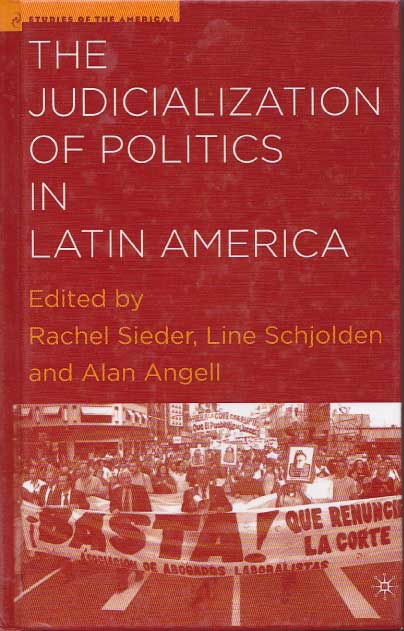
During the last two decades the judiciary has come to play an increasingly important political role in Latin America. Constitutional courts and supreme courts are more active in counterbalancing executive and legislative power than ever before. At the same time, the lack of effective citizenship rights has prompted ordinary people to press their claims and secure their rights through the courts. This collection of essays analyzes the diverse manifestations of the judicialization of politics in contemporary Latin America, assessing their positive and negative consequences for state-society relations, the rule of law, and democratic governance in the region. With individual chapters exploring Argentina, Brazil, Chile, Colombia, Costa Rica, Mexico, Peru and Venezuela, it advances a comparative framework for thinking about the nature of the judicialization of politics within contemporary Latin American democracies.
(2009) ed. with Line Schjolden and Alan Angell. The Judicialization of Politics in Latin America, Palgrave Macmillan. New York, 2nd ed.
Vergüenza: Autoridad, Autonomía y Derecho Indígena en la Guatemala de Posguerra
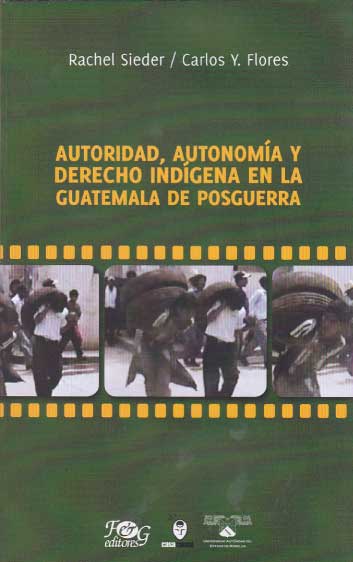 Across Latin America, debates and practice around indigenous law provide a window on shifting relations between indigenous movements, states, and international actors. In Guatemala, the practice of indigenous law is a reflection of cultural difference, a response to past and present violence, and a resource for a population denied access to justice. In the postwar period, indigenous law has become a central element of contemporary Mayan identity politics. Together with the policy shift toward state-endorsed multiculturalism, this has meant it has become a highly contested and politicized terrain. This article examines attempts by indigenous activists to ‘‘recuperate’’ and strengthen indigenous law – or what is now termed ‘‘Mayan law’’ (derecho Maya) – in Santa Cruz del Quiché, Guatemala. Analysing the tensions between local demands, the Mayan movement, international NGOs and intergovernmental bodies, and the Guatemalan state, it reflects on what they reveal about the limits and contradictions of the multicultural model of justice promoted since the end of the armed conflict.
Across Latin America, debates and practice around indigenous law provide a window on shifting relations between indigenous movements, states, and international actors. In Guatemala, the practice of indigenous law is a reflection of cultural difference, a response to past and present violence, and a resource for a population denied access to justice. In the postwar period, indigenous law has become a central element of contemporary Mayan identity politics. Together with the policy shift toward state-endorsed multiculturalism, this has meant it has become a highly contested and politicized terrain. This article examines attempts by indigenous activists to ‘‘recuperate’’ and strengthen indigenous law – or what is now termed ‘‘Mayan law’’ (derecho Maya) – in Santa Cruz del Quiché, Guatemala. Analysing the tensions between local demands, the Mayan movement, international NGOs and intergovernmental bodies, and the Guatemalan state, it reflects on what they reveal about the limits and contradictions of the multicultural model of justice promoted since the end of the armed conflict.
(2011) with Carlos Y. Flores. Autoridad, autonomía y derecho indígena en la Guatemala de posguerra. Guatemala: F&G Editores-Casa Comal-UAEM. ISBN: 978-9929-552-29-6
Cultures of Legality: Judicialization & Political Activism in Latin America
Ideas about law are undergoing dramatic change in Latin America. The consolidation of democracy as the predominant form of government and the proliferation of transnational legal instruments have ushered in an era of new legal conceptions and practices. Law has become a core focus of political movements and policy-making. This volume explores the changing legal ideas and practices that accompany, cause, and are a consequence of the judicialization of politics in Latin America. It is the product of a three-year research effort sponsored by the Law and Society Association, the Latin American Studies Association, and the Ford Foundation, which gathered leading and emerging scholars of Latin American courts from across disciplines and across continents.
(2010) ed. with Javier Couso and Alex Huneeus. Cultures of Legality: Judicialization and Political Activism in Latin America. Cambridge University Press. ISBN: 978-0-521-76723-1
La Judicialización de la Política en América Latina
 During the last two decades the judiciary has come to play an increasingly important political role in Latin America. Constitutional courts and supreme courts are more active in counterbalancing executive and legislative power than ever before. At the same time, the lack of effective citizenship rights has prompted ordinary people to press their claims and secure their rights through the courts. This collection of essays analyzes the diverse manifestations of the judicialization of politics in contemporary Latin America, assessing their positive and negative consequences for state-society relations, the rule of law, and democratic governance in the region. With individual chapters exploring Argentina, Brazil, Chile, Colombia, Costa Rica, Mexico, Peru and Venezuela, it advances a comparative framework for thinking about the nature of the judicialization of politics within contemporary Latin American democracies.
During the last two decades the judiciary has come to play an increasingly important political role in Latin America. Constitutional courts and supreme courts are more active in counterbalancing executive and legislative power than ever before. At the same time, the lack of effective citizenship rights has prompted ordinary people to press their claims and secure their rights through the courts. This collection of essays analyzes the diverse manifestations of the judicialization of politics in contemporary Latin America, assessing their positive and negative consequences for state-society relations, the rule of law, and democratic governance in the region. With individual chapters exploring Argentina, Brazil, Chile, Colombia, Costa Rica, Mexico, Peru and Venezuela, it advances a comparative framework for thinking about the nature of the judicialization of politics within contemporary Latin American democracies.
Multiculturalism in Latin America: Indigenous Rights, Diversity & Democracy
During the last 15 years Latin American governments reformed their constitutions to recognize indigenous rights. The contributors to this book argue that these changes pose fundamental challenges to accepted notions of democracy, citizenship, and development in the region. Using case studies from Mexico, Guatemala, Bolivia, and Peru, they analyze the ways in which new legal frameworks have been implemented, appropriated and contested within a wider context of accelerating economic and legal globalization, highlighting the key implications for social policy, human rights, and social justice.
(2002) ed., Multiculturalism in Latin America: Indigenous Rights, Diversity and Democracy, Palgrave Press, Basingstoke and London. ISBN: 0-333-71476-8
The Rule of Law in Latin America: The International Promotion of Judicial Reform
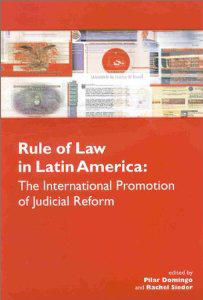
During the last fifteen years over a billion dollars of foreign aid have been spent to support judicial reform processes in Latin America’s fragile democracies. This volume analyses the logic and effects of current international donor efforts to support legal reform across the region. The contributors examine the ways in which international organisations develop and implement their reform agendas, critically analysing the strengths and weaknesses of contemporary approaches. In recent years donors have increasingly emphasised the need to ensure greater civil society involvement in judicial reform. How successful are these approaches in securing greater access to justice and accountability? And how are such efforts linked to broader processes of regime consolidation?
(2001) ed. with Pilar Domingo, Promoting the Rule of Law: Perspectives on Latin America, Institute of Latin American Studies, London. ISBN: 1900039-39-7
Guatemala After the Peace Accords
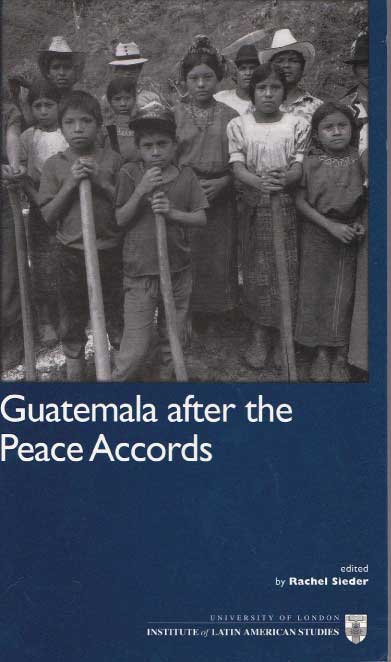
On 29 December 1996 the Guatemalan government of Alvaro Arzú Irygoyen and the Unidad Nacional Revolucionaria Guatemalteca (URNG) signed a comprehensive peace agreement bringing an end to over three decades of internal armed conflict. The essays in this volume were first presented at a conference held at the Institute of Latin American Studies, University of London, in November 1997.
(1998) ed., Guatemala After the Peace Accords, Institute of Latin American Studies, London.
ISBN: 1900039-26-5
Customary Law and Democratic Transition in Guatemala
 This paper examines issues of democratic transition, legal reform and customary law, focusing on the case of Guatemala. The Accord on the Identity and Rights of Indigenous Peoples, signed by the Guatemalan government and the URNG (Unidad Revolucionaria Nacional Guatemalteca) in March 1995 as part of the peace process, commits the government to incorporating the customary law of the country’s indigenous Maya population into the design of the state via legal reforms. Here the importance of customary law for democratic transition in Guatemala is emphasised and a critical perspective for its study and analysis in this context developed. The second half of the paper presents preliminary results of a study in the department of Alta Verapaz applying the methodological approach proposed here.
This paper examines issues of democratic transition, legal reform and customary law, focusing on the case of Guatemala. The Accord on the Identity and Rights of Indigenous Peoples, signed by the Guatemalan government and the URNG (Unidad Revolucionaria Nacional Guatemalteca) in March 1995 as part of the peace process, commits the government to incorporating the customary law of the country’s indigenous Maya population into the design of the state via legal reforms. Here the importance of customary law for democratic transition in Guatemala is emphasised and a critical perspective for its study and analysis in this context developed. The second half of the paper presents preliminary results of a study in the department of Alta Verapaz applying the methodological approach proposed here.
(1997) Customary Law and Democratic Transition in Guatemala, Institute of Latin American Studies, London. ISBN: 1900039-11-7
Derecho Consuetudinario y Transición Democrática en Guatemala
 This paper examines issues of democratic transition, legal reform and customary law, focusing on the case of Guatemala. The Accord on the Identity and Rights of Indigenous Peoples, signed by the Guatemalan government and the URNG (Unidad Revolucionaria Nacional Guatemalteca) in March 1995 as part of the peace process, commits the government to incorporating the customary law of the country’s indigenous Maya population into the design of the state via legal reforms. Here the importance of customary law for democratic transition in Guatemala is emphasised and a critical perspective for its study and analysis in this context developed. The second half of the paper presents preliminary results of a study in the department of Alta Verapaz applying the methodological approach proposed here.
This paper examines issues of democratic transition, legal reform and customary law, focusing on the case of Guatemala. The Accord on the Identity and Rights of Indigenous Peoples, signed by the Guatemalan government and the URNG (Unidad Revolucionaria Nacional Guatemalteca) in March 1995 as part of the peace process, commits the government to incorporating the customary law of the country’s indigenous Maya population into the design of the state via legal reforms. Here the importance of customary law for democratic transition in Guatemala is emphasised and a critical perspective for its study and analysis in this context developed. The second half of the paper presents preliminary results of a study in the department of Alta Verapaz applying the methodological approach proposed here.
Negotiating Rights: The Guatemalan Peace Process
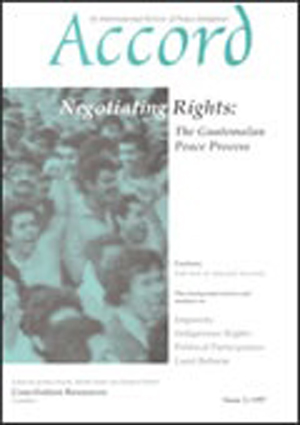 The signing of peace agreements in 1996 ended 36 years of civil war between the Guatemalan government and the Marxist rebel army, Guatemalan National Revolutionary Unit. The peace process went beyond an arrangement between armed groups, allowing regional and civic actors to advance their concerns on issues of social justice, political power-sharing and the rule of law. Accord issue 2 analyses the degree to which deep-seated historical grievances about unfair land distribution, the marginalisation of indigenous people, tight controls on political organisation and unacceptable state violence became marginalised during the process, and the remaining challenges in consolidating the peace agreement. Written by local and international authors, the publication also includes a timeline of the peace process, the full peace accord texts and profiles of the main people and institutions involved.
The signing of peace agreements in 1996 ended 36 years of civil war between the Guatemalan government and the Marxist rebel army, Guatemalan National Revolutionary Unit. The peace process went beyond an arrangement between armed groups, allowing regional and civic actors to advance their concerns on issues of social justice, political power-sharing and the rule of law. Accord issue 2 analyses the degree to which deep-seated historical grievances about unfair land distribution, the marginalisation of indigenous people, tight controls on political organisation and unacceptable state violence became marginalised during the process, and the remaining challenges in consolidating the peace agreement. Written by local and international authors, the publication also includes a timeline of the peace process, the full peace accord texts and profiles of the main people and institutions involved.
Download PDF | Negotiating Rights: The Guatemala Peace Process
(1997) ed. with Jeremy Armon and Richard Wilson, Negotiating Rights: The Guatemalan Peace Process, Accord-Conciliation Resources, London. ISSN: 1365-0742


